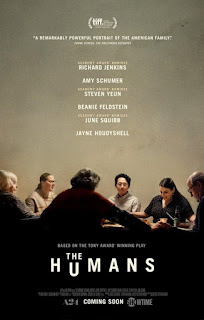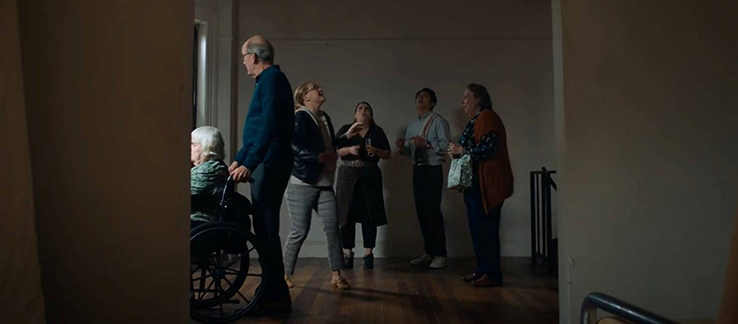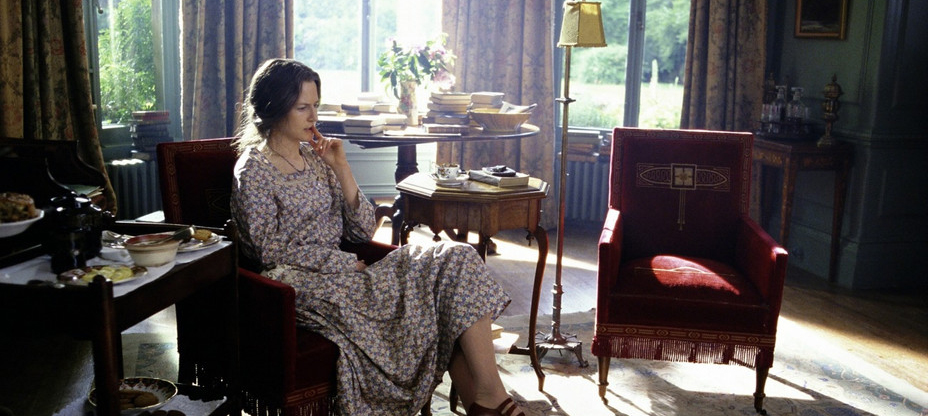“Are the daughter's miseries the mother's triumphs?” - Eva
In cinema filled with dysfunctional family dramas, Ingmar Bergman’s works often loom conspicuously. From Scenes from A Marriage to Cries and Whispers, his grip on this heavy subject has long been both celebrated and cerebrated. Autumn Sonata, the first and last collaboration between the two incomparable Bergmans: Ingmar and Ingrid Bergman, is one of those hefty formidable dramas. Through the estranged relationship between a daughter, Eva (Liv Ullmann), and her concert pianist mother Charlotte (Ingrid Bergman), Ingmar Bergman gazes at their stirring spectacle of disquieting, perpetuated emotional injuries. Here, there are countless feelings embedded meticulously, but all of them are tied up by one notion in common: the perplexity of emotion itself. As much as the concept of emotion can be defined in terms of universal semantics, such as anger, sadness, fear, guilt, love, etc.; the emotion, in general, is a fuzzy concept to describe, and their existence to each other can be as all-encompassing as they can be outwardly incongruous. This thesis, manifested along with a stellar cast, truthful direction, revealing dialogue, and incarcerating cinematography, bring an honest, unposed face to its distrust-rooted delineation.
Like some of his tortured family depictions, Ingmar’s aesthetics are never really reliant on being extremely adorned, but underneath those dusty sepia-tinged frames, it’s a skilfully choreographed piece of dramatic triumph. Together with cinematographer Sven Nykvist, Autumn Sonata’s camerawork moves slowly and often follows the actors’ movement then zooms in on them, only for the frame to be crammed with their faces, fully focusing on their emotions and expressions. It’s so restrained to the point that the diegetic space we’ve left with feels more and more claustrophobic with time. These close-ups perform as an unceasing microscope to capture every minute detail of their face features’ mobility: eyes twitching, forehead lines folding, downturned mouth, to their constantly vivid and unconcealed pores; we notice one thing and many things at once, as they unfold and as they fade. Quietly confrontational and in a way, obtrusively unassuming, these shots reduce their facades away, layer by layer, motif by motif, until there’s no room left to hide.

Bergman's script is attentively constructed all over the gentle but assured emotional exposition—in the silence, everything unfurls and in the clutter of words, the truth conceals. Despite being a melodrama in spirit, Autumn Sonata is very controlled in its overarching outlook of long-repressed feelings. Between the cinematography and the dialogue, the two form an intense, often unnoticed relay race that composedly begins to unearth a giant, ambivalent force of love and hate. The dialogue establishes the two stark personas as it cuts deep into them. In its first act, Bergman uses dialogue brilliantly to show context but rarely to expose them. The essential is faint to the ears and overlooked to the eyes. During its first minutes, the dialogue between Eva and Charlotte sometimes takes detours from the actual gist of what Bergman is trying to tell, all while hinting a deeper theme underneath its surface that is still clearly evident every now and then. In the absence of the dialogue, the camerawork takes over, capturing their unspoken words that are locked away in their guarded chambers while each one tries to play by their socially acceptable roles and norms. All the love, although is never explicitly told, seems to shift back and forth between genuine and performative. It's not until later when everything gets progressively intense: the dialogue becomes more direct, the past becomes barer, and the pain becomes truer. At this point, all their silent thoughts come to light unapologetically, all at once. It's downright brutal and distressing, but only then do they feel real. The length that Bergman goes to surely takes patience, but this finely tuned rhythm is what makes the grit of their relationship even more hard-hitting.
Aside from being an Ingmar Bergman's grand drama with groundedly detailed technicality, Autumn Sonata, more often than not, is also an acting vehicle for its two most formidable Scandinavian stars. As Eva and Charlotte, Ingrid Bergman and Liv Ullmann bring in two unparalleled deliveries that are incredibly dynamic and full-force in the midst of its family turmoil. When we're introduced to Eva, her face bursts with joy and smiles but her eyes brim with uncertain disquiet. She's as uptight as she's elated to finally see her mother Charlotte after seven years. As soon as Charlotte arrives, she hops off her car, in a sophisticated beige outfit and sprucely coiffed hair, an obvious obverse of her own daughter. As two antithetical characters, they lovingly talk to each other with such excitement, trying to reconnect again, convinced they've looked past their lineal demons, only to find that their whole life they haven't—they've simply looked the other way.

As their conversations grow sorer, we discover the past and the revelations, maturely anchoring both slants without vilifying one another. One of their first unuttered dissonances is remarkably shown in the piano scene. With them both trying to bond over music, the scene is thoroughly serene. The only thing that can be heard is Eva's imperfect attempt at Chopin's piece, yet the camera lingers on Charlotte's face. Charlotte listens and heeds cautiously, leniently forbearing for a minute then hushedly peeved in the next, all while sustaining her discreet bit of a show. "I liked you," Charlotte politely dodges her daughter's pining for approval, torn between her motherly image and concert pianist persona. Subsequently, she proceeds to play her interpretation while dissecting the piece lengthily. Eva is visibly upset but continues to come along anyway. She softly contemplates her mother's face: engrossed, determined, and passionate. Eva droops her posture a little, for a moment her mind is elsewhere, then she comes back and dismally stumbles upon a fact: it's her first time seeing her mother's genuine, bare affection her whole life. And that's through music, not her. Bergman and Ullmann play this scene masterfully, veering to and fro between their extensive vocabulary of nuances. But this scene is just a slice of their brilliant command of acting. As more secrets get unlocked, more truthful and aching clashes burgeon. The reality continues to catch up with them until they're trapped within the irreversible state of harsh realization—that they're each other's constant reminder of failures and damages. In that state, every dialogue is retrospective, a looking glass to each passive-aggressive memory, and a cynical attempt at emotional abreaction. The weight gets bigger and louder, and so does their acting. Inside and out, it's a masterful acting marathon in which every powershifting is finely drawn from time to time.
Autumn Sonata, is just painful. It's part melodic and part ugly-sounding, but like Charlotte's perfect description of Chopin's prelude, it's meant to sound wrong. This translates well to their story: Eva longs for her mother's affection meanwhile Charlotte devotes her life entirely to music, it's a sharp observation of unreciprocated love, hidden guilt, and embellished ugliness that simply rings true. Powered by its commanding performances, Autumn Sonata sees Ingmar Bergman voyaging his account of dark family-centric underbelly through the confined, discreetly thrilling setting of stillness, chaos, and everything in between. From the dissembled propriety, abrasive reverie, up to the moments when all hell breaks loose, this small 99-minute wonder lets us absorb and drench completely in it, slowly inviting us to experience the never-ending spectrum of human misery. Agitated, embarrassed, wretched.



















































